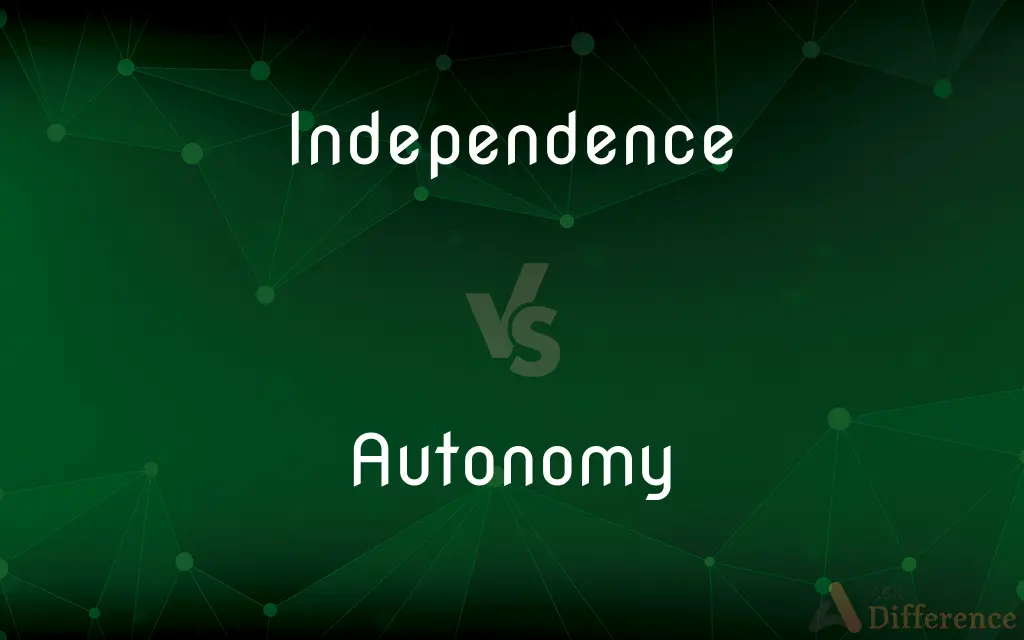Independence vs. Autonomy — What's the Difference?
By Tayyaba Rehman — Updated on October 9, 2023
Independence denotes freedom from control or support, while autonomy implies self-governance or self-direction. Both suggest self-sufficiency, but autonomy emphasizes internal control and decision-making.

Difference Between Independence and Autonomy
Table of Contents
ADVERTISEMENT
Key Differences
The concepts of independence and autonomy intertwine, yet each holds its unique significance. Independence primarily signifies a state of being free from external control or support. It speaks to a condition where an entity, be it an individual or a nation, operates without reliance or influence from others. Autonomy, however, delves deeper into the realm of self-governance or self-direction, focusing on the capacity and right to make one's decisions.
Reflecting on personal contexts, independence might describe someone who lives on their own, financially supports themselves, and doesn't rely on others for daily living. In contrast, autonomy touches on personal agency, highlighting one's ability to make choices and decisions based on personal values, beliefs, or interests. For instance, an individual might have the independence to live alone but may lack autonomy in decision-making due to external pressures.
When thinking of larger entities, like nations or organizations, independence typically represents a clear separation from other bodies. For example, a country gaining independence is freeing itself from colonial or external rule. Meanwhile, autonomy within this context implies that the entity has its governance structures or policies, often granted within the framework of a larger system. An autonomous region, for instance, might govern its affairs while still being part of a bigger nation.
In essence, while both independence and autonomy hint at self-reliance and freedom, their nuances differ. Independence stands against external influence or support, emphasizing detachment. Autonomy, meanwhile, underscores internal control, freedom of will, and the capability for self-governance, irrespective of external dependencies.
Comparison Chart
Basic Definition
Freedom from external control or support
Self-governance or self-direction
ADVERTISEMENT
Emphasis
Detachment from others
Internal control and decision-making
Personal Context
Not relying on others for living
Ability to make choices based on personal values or beliefs
Larger Entities
A clear separation from other bodies, e.g., nations from colonial powers
Governance structures within a larger system
Dependency Relation
Absence of external dependencies
Can coexist with dependencies but with self-governance
Compare with Definitions
Independence
Independence means freedom from control or influence of another.
The country celebrated its day of independence from colonial rule.
Autonomy
Autonomy suggests the ability to make decisions based on one's own values or beliefs.
He valued his autonomy in choosing his career path.
Independence
Independence can be the state of being separate or distinct.
The independence of the judiciary is crucial for justice.
Autonomy
Autonomy indicates self-governance or control over one's actions.
The organization granted him complete autonomy over his project.
Independence
Independence denotes self-sufficiency without reliance on external aid.
She moved out at 18, showcasing her independence.
Autonomy
Autonomy denotes freedom from external control or influence.
The region demanded greater autonomy from the central government.
Independence
Independence represents a condition of not being influenced or affected by others.
Her artistic independence set her apart in the industry.
Autonomy
Autonomy implies personal agency in thought and decision-making.
Despite the team's influence, she retained her autonomy in decision-making.
Independence
Independence is a condition of a person, nation, country, or state in which its residents and population, or some portion thereof, exercise self-government, and usually sovereignty, over its territory. The opposite of independence is the status of a dependent territory.
Autonomy
In developmental psychology and moral, political, and bioethical philosophy, autonomy is the capacity to make an informed, uncoerced decision. Autonomous organizations or institutions are independent or self-governing.
Independence
The fact or state of being independent
I've always valued my independence
Argentina gained independence from Spain in 1816
Autonomy
The condition or quality of being autonomous; independence.
Independence
The state or quality of being independent.
Autonomy
Self-government or the right of self-government; self-determination.
Independence
(Archaic) Sufficient income for comfortable self-support; a competence.
Autonomy
Self-government with respect to local or internal affairs
Granted autonomy to a national minority.
Independence
The quality or state of being independent; lack of dependence; the state of not being reliant on, or controlled by, others.
Autonomy
A self-governing state, community, or group.
Independence
The state of having sufficient means for a comfortable livelihood.
Autonomy
(uncountable) The right or condition of self-government; freedom to act or function independently.
Independence
The state or quality of being independent; freedom from dependence; exemption from reliance on, or control by, others; self-subsistence or maintenance; direction of one's own affairs without interference.
Let fortune do her worst, . . . as long as she never makes us lose our honesty and our independence.
Autonomy
A self-governing country or region.
Independence
Sufficient means for a comfortable livelihood.
Autonomy
The capacity to make an informed, uncoerced decision.
Independence
Freedom from control or influence of another or others
Autonomy
The capacity of a system to make a decision about its actions without the involvement of another system or operator.
Independence
The successful ending of the American Revolution;
They maintained close relations with England even after independence
Autonomy
The status of a church whose highest-ranking bishop is appointed by the patriarch of the mother church, but which is self-governing in all other respects. Compare autocephaly.
Independence
A city in western Missouri; the beginning of the Santa Fe Trail
Autonomy
The power or right of self-government; self-government, or political independence, of a city or a state.
Independence
Independence refers to the ability to think or act freely.
His independence of thought was evident in his unique solutions.
Autonomy
The sovereignty of reason in the sphere of morals; or man's power, as possessed of reason, to give law to himself. In this, according to Kant, consist the true nature and only possible proof of liberty.
Autonomy
Immunity from arbitrary exercise of authority: political independence
Autonomy
Personal independence
Autonomy
Autonomy refers to a state of independence within a larger framework.
The university maintained its autonomy while receiving federal funds.
Common Curiosities
How is autonomy different from independence?
Autonomy emphasizes self-governance and internal decision-making, while independence emphasizes freedom from external control or support.
Can a person be independent but not autonomous?
Yes, one might not rely on others (independent) but could still be influenced or controlled in their decisions (lacking autonomy).
What does independence mean?
Independence denotes freedom from external control, influence, or reliance.
How is independence related to freedom?
Independence is a form of freedom, specifically from external control, support, or influence.
Why is autonomy important in workplaces?
It fosters personal agency, responsibility, and can boost motivation and job satisfaction.
How do independence and autonomy relate to self-reliance?
Both concepts emphasize aspects of self-reliance; independence on self-sufficiency and autonomy on self-governance.
Is autonomy only about personal decisions?
No, autonomy can also refer to entities like regions or organizations having self-governance within larger systems.
Can autonomy exist without complete independence?
Yes, one can have the capacity for self-governance (autonomy) even within dependencies.
Is autonomy a form of power?
Yes, it can be viewed as the power of self-governance and decision-making.
Can there be drawbacks to too much independence?
Potentially, as excessive independence might lead to isolation or a lack of collaboration.
Can a country have autonomy but not independence?
Yes, an autonomous region might govern its affairs but still be part of a bigger nation.
Is independence always about nations or countries?
No, independence can also refer to individuals, ideas, or entities being free from external influence or support.
In what contexts is autonomy crucial?
In decision-making, moral choices, personal careers, and governance, among others.
Does independence always mean isolation?
No, independence signifies freedom from reliance or control, not necessarily isolation from others.
Is seeking autonomy a universal desire?
While many value autonomy, its importance can vary based on individual preferences and cultural values.
Share Your Discovery

Previous Comparison
Anoxia vs. Hypoxia
Next Comparison
Pod vs. GamAuthor Spotlight
Written by
Tayyaba RehmanTayyaba Rehman is a distinguished writer, currently serving as a primary contributor to askdifference.com. As a researcher in semantics and etymology, Tayyaba's passion for the complexity of languages and their distinctions has found a perfect home on the platform. Tayyaba delves into the intricacies of language, distinguishing between commonly confused words and phrases, thereby providing clarity for readers worldwide.














































